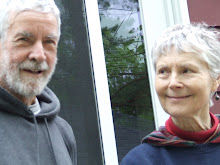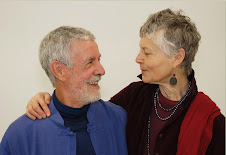Dear
Family and
Friends,
Four
years ago today, Francis and I were embarking on the most momentous days of our
lives, approaching together his death and transition twelve days later. Last
year, because I was writing about that journey, I used the expression
“nadir and zenith.” But it’s different this year. I still tear up easily, but I
am so filled with gratitude and joy about the second book that this year, joy
overcomes grief. It feels as if completing Sing to Me and I Will Hear You –
A Love Story is the biggest thing I’ve done in my life. It was like
something I had to do before I die. With only one more spiral bound hard
copy galley proof to scrutinize, the book will be available early in 2014.
Two
things made a big impact on me in recent weeks: a reflection by the Aramaic
scholar with whom I’ve studied since 1996, and, hearing the Portland Symphony
Orchestra play Johann Sebastian Bach’s Cantata # 140 – “Sleepers Awake.”
A
few times a year, those who study with Dr. Neil Douglas-Klotz receive from him
an online reflection to ponder. (He’s the one whose two biblical chants helped
Francis through his final days.) “The Psalms,” he wrote, “mention
seven times of prayer, according to the progress of the sun. The stages of the
sun through the day can help us remember the preciousness of life and the
stages of time passing--birth (morning), full bloom of youth (midday),
mid-afternoon (wisdom of maturity), late afternoon/sunset (the day 'nearly over'
- reminding us that life in these bodies doesn't last forever), evening
(preparing to 'die before we die')”
It’s
clear that at 78, I’m in the evening time of my life. I don’t mind that because
aging has its gifts. Then there’s this:
The
text of Bach’s cantata based on Jesus’ parable of the wise and foolish virgins,
calls for the inhabitants of Jerusalem to waken, take up their lamps, prepare
the feast, and go out to meet the Bridegroom. In Bach’s 17th-18th
century world, faith was simpler; heaven was understood literally then. Even
knowing that, and by contrast, a bit about modern scientific views, in hearing
the glorious cantata, I felt transported by that Coming it announced. After
pondering this for days, I can’t help believing that the desire for life after
death, engrained in the human psyche from earliest times, is so strong, that
that fact in itself argues in its favor. No one could convince me that love
dies with the person who dies.
Francis
and I heard Sister Elizabeth Johnson speak at a conference in 2000, about her
book, Friends of God and Prophets, A Feminist Reading of the Communion of
Saints. She found it hard to face, she told us - what she discovered after
extensive research and reflection: “Empirically, the darkness of death is
unconquerable.” Death is a genuine end to historical life. Her book concludes:
“the only possible response {is} faith in its rawest form. Taking the risk that
God will be there. . . . The promise of God is bound to what is empirically the
end of all promise.” (p. 220) I give thanks for this gift of faith. Her next
chapter “Companions in Hope” builds on faith. That part of my book is
underlined even more.
In
the earlier years after Francis died, I was tempted to think I just wanted to
write my books, and then, “join” him. But then, as expressed in my poem
“Widow’s Time,” (from Sing . . . The Poems), I saw that I have additional work to do –
rallying to protect the environment for our children, work for peace and
justice in the world, and work also, for example, teaching English to Africans.
I already love doing that, but for now,
it’s on a limited time basis - after mass on Sundays.
In a sense, the first two stanzas of that Widow’s Time poem allude to what I’ve focused on in the last four
years - “not moving on, but in,” and “crack(ing) open memories’ nuts.” Now, after
having written this especially demanding second book, Sing to Me and I Will
Hear You – A Love Story, I sense that I’ve jumped over the highest of three
hurdles. With the first half of the third book already written – Sing to Me
and I Will Hear You – The Uncollected Poems and Journals, the third
“hurdle” is the journals. (By the way, I’m in awe at how the poems in
the first book continue to speak to me, confirming and revealing as they do -
new nuances.)
I’m also in awe at many
unexpected developments, two I haven’t
told you about yet. This one I’ll mention now is more personal, not
oriented to promotion of the books: I was invited to chant during Christmas Eve
mass the ancient Christmas Proclamation
from the Roman Maryrology. I did that once before in 1955, in Latin, while
in the novitiate in Missouri. It moves me no end to have this privilege a
second time - fifty-eight years later! The English text I’ll use is a combination of these two on
youtube: http://www.youtube.com/watch?v=-cWykjM1k90 and http://www.youtube.com/watch?v=niFqd2miMCM
As a friend in CORPUS puts it - Enjoy the wonder and
blessings of this Christmas season – and I add Solstice too, with its “long
moon.”
With Gratitude and Love,
Elaine

















